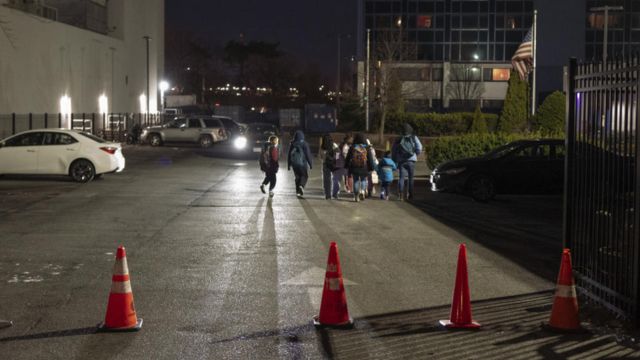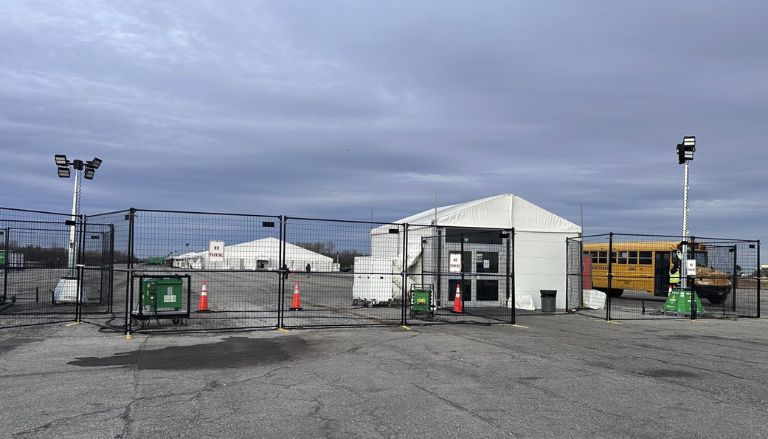NEW YORK — New York City shut down a huge tent city that housed hundreds of immigrant families on a rural former airport in Brooklyn. This is part of a plan to reduce the number of emergency shelters that were built in response to a surge of people coming from the southern border that has been slowly going away over the past few months.
About 2,000 people were living on the windswept tarmac at Floyd Bennett Field, which used to be the city’s first airport. The last of them left the gated camp over the weekend, and this week workers were seen taking down the huge structure.
Supporters had said that the building, which is on leased government land, could be open to raids by immigration officers after Monday when President-elect Trump takes office.
Rodriguez, 47, from Venezuela, said that he, his wife, and their three kids were moved to a different city-run shelter nearby just one week before Christmas.
“That’s a better place for the family to live.” We have three rooms for our group of five. He spoke Spanish and was amazed at how different it was from the hard chairs they had been sleeping on in their single room at the airport tent camp since they got to the country in October.
According to Mayor Eric Adams’ administration, more than 250,000 migrants have come to New York since spring 2022. However, the number of newcomers has been going down for 27 weeks in a row and is now at its lowest level in more than a year.
There are now about 50,000 refugees living in about 200 temporary sites. This is less than the nearly 70,000 who lived there in January of last year.
However, the constant closing of shelters and being forced to move has made it hard for many migrant families to keep up with work, school, and other daily tasks while they are trying to get settled in the city.
A migrant from Venezuela named Gabriel Montilla said he now spends hours every day traveling to and from work, taking his three young children to school in Brooklyn and rushing to make appointments since his family was moved from the now-closed Floyd Bennett Field camp to a hotel in Queens.
After dropping off the kids on a cold and windy Tuesday, he had just enough time to drive across Brooklyn to a government office to turn in his immigration paperwork.
He said in Spanish, “It would be different if it were summer or something else that wasn’t so cold.” “But at least for now it’s too strong, very strong; it’s hard.”
Migrant rights groups also say that more needs to be done to help migrants move into more permanent homes.
Will Watts, deputy executive director at the Coalition for the Homeless, said that some of the most important things should be getting rid of controversial policies that limit the amount of time migrants can stay in a shelter and investing in better case management and legal help for getting immigration status and work permits.
Steph Rudolph, an attorney at the Legal Aid Society, said that newly arrived migrants should also be brought into the city’s regular shelter system for the poor. This way, they would not be separated and would be safer from immigration officials.
Trump has said that he will crack down on immigration across the country, including deporting a lot of people.
As the number of people goes down, Rudolph said, “there is no longer a reason for a separate system.” “Putting everyone on the same level makes sense.”
Gonzalez said he is worried about the future of his family, even though they were glad to get out of the airport shelter.
“They should respect the laws,” he said of the new government, adding that he and his wife had applied for asylum, had their work permits taken care of, and were working part-time at a nearby grocery store. “We are following all the rules set by the country’s laws.” We pray that everything goes well.

In the next few weeks, more shelters will have to close.
Another huge tent city, on Randall’s Island off the coast of Manhattan, has slowly lost its people as it gets ready to close next month.
The Adams administration also said on Friday that 10 other shelters would be closing. One of these was in a complex of warehouses off of a highway in Brooklyn that at its busiest time held more than 3,300 single men.
According to the mayor’s office, the changes will lower the number of beds available for migrants by about 7,800. This is after taking into account the fact that a new shelter is being built in the Bronx to house more than 2,200 men who are being moved from the tent shelters that are going to be closed.







Leave a Comment